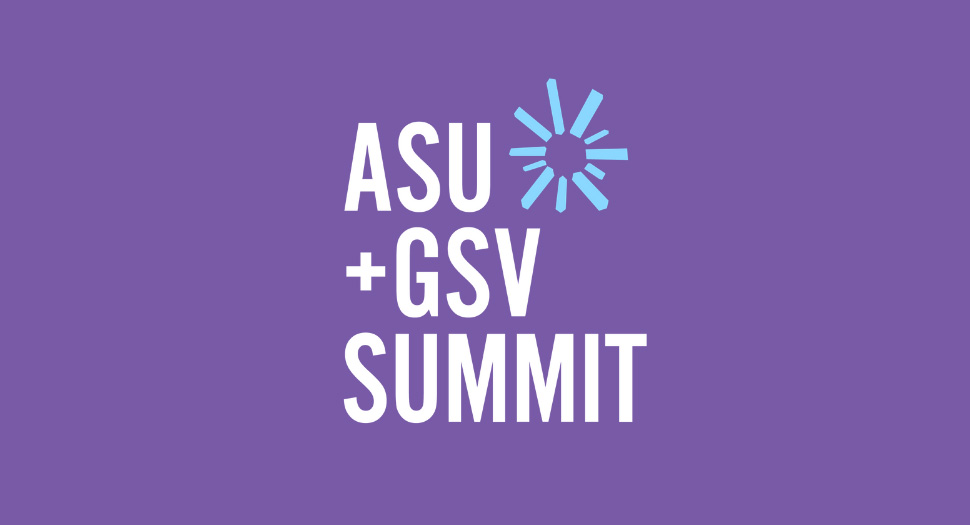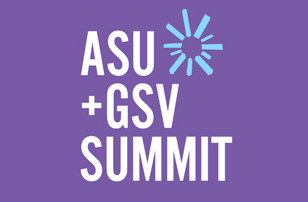Summary
American Student Assistance (ASA) is a proud sponsor and content thought partner of the 2022 ASU+GSV Summit. With a diverse audience consisting of learning and workforce technology CEOs from across the globe, investors representing $5 trillion in assets, K-12 leaders, higher education leaders, chief learning and talent officers, and policy makers, the annual event connects leading minds focused on transforming society and business around learning and work.
Thought Leadership Sessions
The Summit’s new career-connected learning track, “Career Readiness: Expanding the Edge,” will feature nine ASA-curated thought leadership panel sessions focused on new research, innovative models for student success, fresh insights, and best practices. Discussion topics include “Learning About Careers: A Dichotomy–Inside or Outside the Classroom,” “Landmark Study: College is Not the Only Path,” “Career Readiness in America: An Inaugural Report,” “Gen Z Agency, Voice and Career Choice,” “Invigorating the Youthforce: Mentorships, Social Capital and Work-Based Learning,” “Unbundled Learning–And How to Rebundle Pathways,” and “Scaling Gen Z Skill-building Programming for Young Entrepreneurs.”
Session Recaps
Career Readiness in America: An Inaugural Report from CCDC
American Student Assistance and the Coalition for Career Development Center (CCDC) look at the state of career readiness in America. In striving to make career readiness a priority, the CCDC created the Condition of Career Readiness in the US report to identify gaps and progress to career readiness outcomes. This is the first report of its kind that combines federal, state and national agency data sources and will identify practices that increase the ROI for investing in career services. Panelists will discuss the condition of career readiness, if we are properly preparing students for the future, and if not, how we can fill the gaps.
This Panel was Moderated By:
Julie Lammers SVP, Advocacy & Corporate Social Responsibility, American Student Assistance (ASA)
Panelists Included:
Scott V. Solberg Vice President of Research, Coalition for Career Development (CCDC)
Jane Swift Former Massachusetts Governor and President and Executive Director, LearnLaunch
Lydia M. Logan Vice President, Global Education and Workforce Development, IBM Corporate Social Responsibility
Invigorating the Youthforce: Mentorships, Social Capital and Work-based Learning
Eighty percent of Gen-Z are unemployed and only 5% say they have had an internship or a part-time job. Moreover, only 38%* have someone who models good work ethic and healthy relationships. Cultivating connectedness is an integral piece of invigorating the youthforce. So why do so few have access to the networks and experiences they need? Many are embracing the challenge. Innovative high school models, like Big Picture Learning, are leveraging practical tools and resources to help youth identify their passions, navigate their options, and get set up for long-term career success. Others, like Christensen Institute and MENTOR National are calling for mentoring practices that contribute to more equitable access to mentors–in and out of the classroom. While others are expanding the opportunity to experience work-based mentorships through critical work-based learning experiences. How do organizations help scale such vital relationships and experiences for young people?
This Panel was Moderated By:
Mahnaz R. Charania Ph.D., Senior Research Fellow, Clayton Christensen Institute
Panelists Included:
Andrew Frishman Co-Executive Director, Big Picture Learning
David Shapiro CEO, MENTOR National
Daquan Oliver Founder and CEO, WeThrive
Nancy Soni CEO & Co-founder, Pathmatch
Fireside Chat: The Future of Career Education
Career readiness learning opportunities are not uniform across the U.S. and our school systems have competing—and often conflicting—priorities, which makes access to experiences that are proven to increase students’ long-term success sporadic, at best. The Covid-19 Pandemic has also exacerbated learning challenges—creating fundamental inequity in education and, unfortunately, slowing the progress of a national standard for career education in our school systems. The results? Students do not have equitable access to the information they need to make informed career and postsecondary education plans, limiting their opportunity for long-term success. The silver lining of this crisis is an opportunity to reset the ways in which we think about career education and the age at which we begin having these important conversations. Listen as two prominent thought leaders discuss an alternative to learning about careers in the classroom and what just could be the most effective approach to achieving equitable access to career education.
Panelists Included:
Jean Eddy President & CEO, American Student Assistance (ASA)
Michael B. Horn Author and Senior Strategist, Guild Education
Landmark Study: College is Not the Only Path
Across the nation, employers are collaborating with higher education systems to help solve the employer pipeline issue. But is it enough? With postsecondary enrollment down and only 53% of kids likely to go to college, should employers change their mindset about requiring degrees? What’s replacing the candidate quality assurance if not a degree? Join us for a debut of a landmark research study on the perceptions of high-quality, postsecondary pathways and a discussion on the evolving narrative around these options, how to ensure the quality and efficacy of these non-degree options, how to help students & families navigate them, and the role of employers in advancing equitable access to opportunity for learners and workers.
This Panel was Moderated By:
Julie Lammers SVP, Advocacy & Corporate Social Responsibility, American Student Assistance (ASA)
Panelists Included:
David Soo Chief of Staff, Jobs for the Future (JFF)
Ryan Craig Managing Director, Achieve Partners
Jason A. Tyszko Vice President, U.S. Chamber of Commerce Foundation
Pat Leonard Vice President, Strategic Partner and Business Development, Credly
Catalyze Challenge: Rewarding Innovation in K-12 Career Development
Catalyze is a collaborative funding engine that awards prizes for innovative, early-stage models that leverage career-connected learning to support students in accessing living wage careers. The Challenge funds programs along three thematic areas of focus: 1) Real-world learning and career exposure models that allow students, especially in early years, to develop career identities, wherever students can be most effectively served; 2) Innovative models that prepare students for post-HS transitions to family-sustaining jobs and careers; 3) Earliest stage radical, out-of-the-box proposals that have the potential to transform how we effectively prepare America’s young people for their careers. Watch the panel as they discuss the program and hear from Catalyze Challenge winners on their innovative solutions and impact they are driving with students around the United States.
This Panel was Moderated By:
George Vinton CEO, The Common Group
Panelists Included:
Daquan Oliver Founder and CEO, WeThrive
Dr. Kim Alexander CEO, Collegiate Edu-Nation
Lauren Thomas Quigley Senior Advisor of Curriculum, Impact, and Innovation, Hack the Hood
Naomi Boyer Executive Director, Digital Transformation, Propel Polk
Spotlight on Gen Z Agency, Voice and Career Choice
Only 57% of today’s learners believe that our school systems have successfully prepared them for careers. But with ever competing priorities, many school systems simply can’t take on one more task to work career-connected education into the school day. The results? Students do not have equitable access to the information they need to make informed career and postsecondary education plans. Panelists debate the dichotomy of two promising career-connected learning models that aim to either change education systems, or take this learning outside the classroom. Citizen Schools and Project Lead the Way are seeing results in the classroom by fundamentally shifting how kids learn about careers. ASA shares what they’ve learned from 3 years of grant making and, with Roadtrip Nation and Ender (a competition platform for kids), discusses how self-directed, digital-first experiences outside the classroom can rapidly close the equity gap in exposing learners to career and the paths to reach them.
This Panel was Moderated By:
Jason Cascarino Strategic Advisor and Consultant
Panelists Included:
Jean Eddy CEO, American Student Assistance (ASA)
Oscar E. Cruz CEO, Citizen Schools
Gautam Bhargava Co-founder and CEO, Ender
Mike Marriner President & Cofounder, Roadtrip Nation
Kathleen Mote EVP & Chief Strategy & Innovation Officer, Project Lead The Way
Unbundled Learning–And How to Rebundle Pathways
For those with access, agency, and advocates, the last two years created greater opportunity for unbundling learning. How we rebundle and credential learning will be the next big education innovation and could create an explosion of opportunity, but also a mess that expands inequity. Facing increasing choice, increasing demand by parents, and increasing quality options, schools that reframe learning to credential, credit, and count programs and experiences outside of the traditional program will thrive. Watch the session to explore the future of credentialing, how to define and credential skills, why it’s crucial to credential experiences in and out of the classroom, and a new vision for learner records.
This Panel was Moderated By:
Tom VanderArk CEO, Getting Smart
Panelists:
Jean Eddy President and CEO, American Student Assistance (ASA)
Julie Young Vice President of Education Outreach and Student Services for Arizona State University, and the Managing Director of ASU Prep Academy and ASU Prep Digital School
Alberto Acereda Educational Testing Service
Scaling Gen Z Skill-building Programming for Young Entrepreneurs
Fifty four percent of GenZ aspire to be entrepreneurs. But, how does a kid turn an aspiration into a career? It’s on us, folks. We, collectively, need to provide entrepreneurial education experiences that build the skills young entrepreneurs need to succeed. Durable skills–such as critical thinking, communication and presentation, collaboration, leadership, financial literacy, creativity and learning to take risks and accepting failure–are the secret sauce for future entrepreneurs. But, are we doing our jobs and ensuring that all students have equitable access to skill–building programming in middle and high school? It’s a revolution in the making and these nonprofits are tackling the challenge to forge a more entrepreneurial America.
This Panel was Moderated By:
Julie Lammers SVP Advocacy & Corporate Social Responsibility, American Student Assistance (ASA)
Panelists:
J.D. LaRock CEO, NFTE
Tim Taylor Co-Founder and President, America Succeeds
Edson Barton CEO and Founder, YouScience
Naomi Thomas CEO, ∞edu (InfinityEDU)

